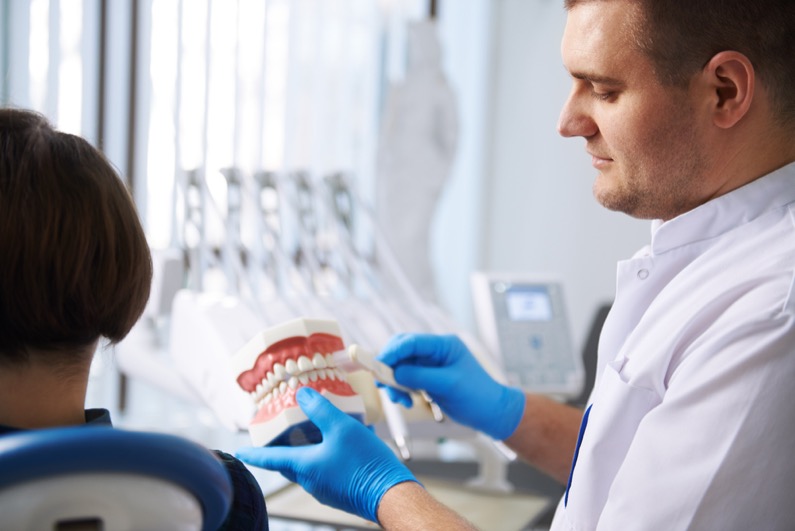Ever felt a twinge in your gums while brushing? Or noticed a bit of blood while flossing? You might have problems with your gums. Gum disease, also known as periodontal disease, is a common oral health concern that can have serious implications if left untreated. In this article, we’ll share everything you need to know about gum disease and what you can do to treat or prevent it.
What is gum disease?
Gum disease refers to a range of conditions that affect the supporting structures of the teeth, including the gums, bone, and ligaments. It typically starts with the inflammation of the gums, a condition called gingivitis, and can progress to more severe stages if not properly managed.
At first glance, the term “gum disease” might not sound intimidating. After all, it’s easy to underestimate the power of a name. However, beneath the surface lies a potentially grave threat to your oral health—one that demands your attention and understanding.
What causes gum disease?
Gum disease is primarily caused by the accumulation of plaque—a sticky film of bacteria—on the teeth and gums. Poor oral hygiene, smoking, genetic predisposition, certain medications, and systemic diseases can increase the risk of developing gum disease.

The Stages of Gum Disease
Think of the structures supporting your teeth like a foundation for a house. Your gums encase your teeth, the bone holds them in place, and ligaments keep everything connected. Together, they maintain your dental health.
While the term “gum disease” might not instantly evoke a sense of urgency, it’s important to peel back the layers and recognize its potential impact on your overall oral health.
Gum disease develops through several stages, each with its own characteristics and implications:
Gingivitis
Gingivitis is where gum disease starts, like the first hints of a problem. Inflammation, caused by plaque buildup with bacteria, makes your gums red, swollen, and sometimes bleed, especially during brushing or flossing.
Periodontitis
Untreated gingivitis can progress to periodontitis, where the infection reaches deeper into the supporting structures of the teeth. Pockets form between the teeth and gums, leading to further inflammation and potential bone loss.
Advanced Periodontitis
In this advanced stage, the damage to the bone and connective tissue is extensive. Teeth can become loose, affecting your bite and overall oral health.
Do I have gum disease?
Understanding the symptoms of gum disease is a key step in catching it early for effective treatment. By paying attention to these common signs, you can take proactive measures:
- Red, Swollen, or Tender Gums
Your gums might take on a reddish hue and feel swollen or tender to the touch. This is often a clear signal that something’s amiss. Bad gums can also sometimes show a darker color.
- Bleeding Gums During Brushing or Flossing
If your gums bleed while brushing or flossing, it’s a telltale sign of potential gum disease. Healthy gums should not bleed during routine oral care.
- Persistent Bad Breath
Bad breath that seems to stick around despite your best efforts could be an indicator of gum disease. The bacterial activity associated with gum disease can contribute to foul odors.
- Receding Gums and Longer-Looking Teeth
Gum disease can lead to gums gradually pulling away from the teeth, making them appear longer than usual. If you notice this, it’s a signal to take action.
- Changes in Your Bite
When you bite down, if you suddenly feel that your teeth are fitting together differently or if there’s an unusual sensation, it could point to gum disease affecting the supporting structures.

How is gum disease treated?
Understanding how gum disease is treated is essential for managing its progression effectively. The treatment approach varies depending on the stage of the condition. Here’s a breakdown of the strategies employed:
Treating Gingivitis
In the early stage of gum disease, known as gingivitis, the focus is on reversal. Professional dental cleanings play a pivotal role in removing plaque and tartar buildup that contribute to inflammation. Coupled with improved oral hygiene practices at home, such as regular brushing and flossing, along with conscious efforts to steer clear of risk factors like tobacco use, gingivitis can often be halted and even reversed.
Advanced Treatment for Advanced Cases
For cases that have advanced to periodontitis, a more comprehensive approach is needed. Treatments may include:
- Scaling and Root Planing: This non-surgical procedure involves a thorough cleaning of the tooth surfaces and roots to remove plaque and tartar buildup from the pockets formed by gum disease. It helps promote gum reattachment and reduces pocket depth.
- Laser Therapy: Advanced laser technology can be employed to target and remove infected tissue while promoting healing and reattachment of healthy tissue.
- Surgical Interventions: In more severe cases, surgical procedures might be necessary. These can include flap surgery to access and clean the deeper pockets, bone grafting to replace lost bone, or soft tissue grafts to reinforce receded gums.
Personalized Care for Optimal Results
The treatment approach is tailored to each individual’s unique needs. Factors such as the stage of gum disease, overall health, and specific dental history all play a role in determining the most effective course of action.
Preventive Measures
Regardless of the treatment stage, proactive steps are vital to prevent a recurrence of gum disease. Maintaining rigorous oral hygiene practices, attending regular dental check-ups, and adopting a healthy lifestyle that deters risk factors like smoking are crucial for long-term gum health.

What Happens if Periodontal Disease Goes Untreated
Leaving gum disease untreated can result in significant consequences. Here’s what can happen to your oral health:
Advanced Tooth Mobility
As gum disease progresses, it can lead to the loosening of your teeth. This mobility can make everyday activities like eating and speaking uncomfortable, impacting your quality of life.
Eventual Tooth Loss
Without timely intervention, the structures supporting your teeth can deteriorate, potentially resulting in tooth loss. This not only affects your smile’s appearance but also hampers your ability to bite and chew properly.
Impact on Overall Health
The effects of gum disease aren’t confined to your mouth. Studies have shown a connection between untreated gum disease and systemic health conditions. Gum disease can contribute to systemic inflammation, which has been linked to serious issues such as heart disease and diabetes.
Neglecting to address gum disease allows it to progress unhindered, paving the way for more extensive damage to your oral health and potentially causing ripple effects throughout your body.
That’s why it’s crucial to recognize the potential severity of leaving periodontal disease untreated and take proactive measures to safeguard both your smile and your overall well-being. Remember, early intervention can make a significant difference.
Gum Disease Prevention
Prevention is key to maintaining healthy gums. Here are some essential steps you can take:
Maintain Consistent Oral Hygiene
Form a routine of thorough brushing and flossing. This helps to prevent the accumulation of plaque and tartar, the culprits behind gum disease.
Kick the Smoking Habit
If you’re a smoker or use tobacco products, consider quitting. Smoking can significantly increase the risk of gum disease and hinder its treatment.
Opt for a Balanced Diet
What you eat matters. Choose a diet abundant in fruits, vegetables, and lean proteins. These nutrient-rich foods contribute to gum health and overall well-being.
Regular Dental Check-Ups and Cleanings
Don’t underestimate the power of professional care. Regular dental visits allow for early detection and intervention, helping to thwart potential gum issues.
Remember, a little effort goes a long way in ensuring optimal oral health. So by embracing these preventive measures, you’re taking proactive steps to safeguard your gums and preserve your smile’s radiance.

When should I see my dentist?
When it comes to dealing with gum disease treatment, seeking advice from dental experts is crucial. These professionals possess extensive knowledge and specialized skills to create treatment plans that suit your specific needs. This personalized approach ensures the best results and helps maintain your bright smile.
Relying on a skilled team of experts empowers you to confidently address gum disease. Your smile deserves the highest level of care and expertise, making dental experts an essential partner in your oral health journey.
If you suspect you have gum disease or notice any of the symptoms mentioned, seeking prompt dental consultation is vital. Whether you’re in Houston, Texas, or elsewhere, professional guidance is essential. Expert dentists, equipped with knowledge and experience, can assess your condition accurately.
In Houston, Texas, you can rely on Dr. Saif Shere, DMD, Brownstone Dental’s lead dentist and Houston’s trusted expert in cosmetic dentistry and gum disease treatment. Don’t let gum disease compromise your smile—schedule an appointment today or visit Brownstone Dental at 9824 Fondren Rd, Houston, TX 77096 to ensure a healthier, brighter future for your oral health.